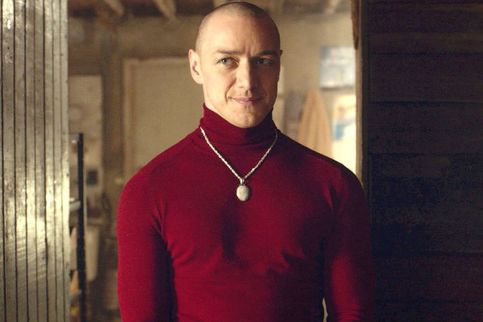C+ | A kidnapper with multiple personalities abducts three teenage girls. Directed by M. Night Shyamalan Starring James McAvoy and Anya Taylor-Joy Review by Jon Kissel |

Shyamalan’s eye and his dramatic sense have also long been his strengths, and that continues here. The sparseness and steaminess of Crumb’s lair make the air thick with apprehension. Tight framing adds to the claustrophobic nature of the girls’ predicament. Part of horror is atmosphere, and Shyamalan and McAvoy ratchet up the creep factor significantly, such that this is a pervasively-icky film. Crumb’s reptilian nature comes out in the Barry and Patricia personas, and an adult acting like a pre-teen is consistently disturbing. Scenes of anticipation are played slowly and masterfully, particularly a painful instance of wire hangers and their unsuitability to unlatching things. Split’s a visceral experience that makes knuckles go white and hearts race on more than one occasion.
That said, it’s also grossly exploitative once it turns over all its cards. Shyamalan’s script ventures into leering territory that he’s never trod into before. He keeps contriving ways to get the girls to lose their clothing and have it stay lost. There’s an attempt to sew it into the motivations by having one of the personalities hate clutter and therefore when one of the girls gets her sweater dirty, she has to remove it. Why not just have him manifest a different quirk? It implies that the main goal is titillation instead of tension, and it closes in on police-procedural levels of transparent pandering.
With his big finale, Shyamalan underlines the creeping grossness and then draws thick Sharpie lines around his crude theme of trauma. It’s blatantly stated that Casey only survives because she has been and continues to be abused by her uncle. Boy, it sure is a relief that Casey lived through all that molestation, or else Crumb would have killed her like those other two girls, weaklings who never had the necessary suffering and paid for it with their lives. It’s one thing to assert that suffering breeds character, but the ugliness of this plot isn’t even necessary if that’s the albeit misguided goal. Casey’s beloved father died during her childhood, in addition to her mother at some unseen moment, but that’s not enough misery for her to go through. Just so we can torture her more, here’s years of rape on top of that grief. This idea of tragedy being some kind of boon is something I wholly reject. The germ of that is tied into so many noxious ideas, like peace breeding weakness or the nobility of suffering. Shyamalan’s put his name on too many abominations for this to be his worst script, but it’s in the running. He’s had horrible premises and laughable dialogue on the page before, but he’s never been offensive until now.
I think Split becomes completely dismissible by its end. I was with it for a good hour, then eyebrows started to rise before I was spewing Split from my mouth. McAvoy’s and Taylor-Joy’s performances and all of Shyamalan’s assets go to waste in service of his disgusting theme. I don’t care about the franchise that he’s trying to build with the ending tag, and I don’t care to humor his resurgence as a bankable, somewhat respectable director. As far as I’m concerned, Shyamalan has gotten coarser and less-skilled as a writer even as he’s recaptured some of his talents as a director. D’s are where offensive films land for me, and because of McAvoy and Taylor-Joy, I’ll give it the highest grade in that bracket. I find this to be well-made trash. D+
 RSS Feed
RSS Feed